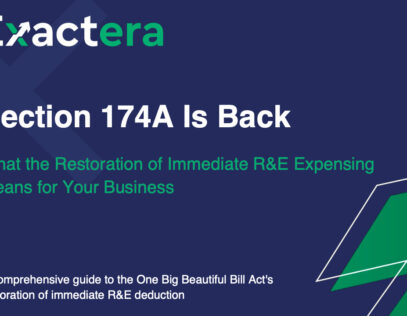As of January 13, 2025, state-level R&D tax credits are officially returning to Michigan. Under House Bills 4368 and 5099-5101, certain flow-through entities and entities subject to corporate income taxes can claim a credit on their IRC 41 qualified research expenditures (“QRE’s”) incurred in Michigan. This credit can be used to reduce the taxpayer’s liability, and—while not transferrable to other entities—could even be refunded should tax liability be exhausted.
Benefit
Two credit computations exist for the Michigan state tax credit:
For businesses with fewer than 250 employees (“Small Businesses”):
• 3% of qualified expenditure up to the base amount, plus
• An additional 15% of expenditure that exceeds the base
• Limited to $250,000 per taxpayer
For those with 250 employees or more
• 3% of qualified expenditure up to the base amount, plus
• An additional 10% of expenditure that exceeds the base
• Limited to $2 million per taxpayer
In both cases, an additional 5% of expenditure incurred with Michigan research universities is available for credit. In these instances, supporting documentation detailing the activities and payments between the taxpayer and university is required.
Base Amount
In general, the Michigan base amount is the prior three-year average of QREs in the state. If the taxpayer lacks QREs in one or more base period, the average is based on the number of tax years with QREs.
For example:
• A taxpayer in 2025 with QREs in 2024 and 2022 but none in 2023 would have a base of (2024 QREs + 2022 QREs)/2.
• A taxpayer with no QREs in any base period has a base amount of $0.
Credit Limitations and Filing
Individual credit claims are limited to $250K for Small Businesses and $2MM for other taxpayers. In total, $100MM has been earmarked for R&D tax credit benefits by the state. Of these $100MM, $25MM are reserved for Small Businesses. If total claims in the state exceed these limits, credits will be prorated across claimants based on whether or not it is a Small Business.
In order to claim this credit, taxpayers must submit a tentative claim by March 15 of the year after the calendar year in which the expenditure was incurred. The only exception to this rule is for the first year of this credit’s eligibility, tax year 2025, for which a tentative claim is due on April 1, 2026. This applies to fiscal year filers as well, meaning a tentative claim could be due midway through a tax year.
A finalized credit claim is then due with the rest of the taxpayer’s return at the normal time of filing.









